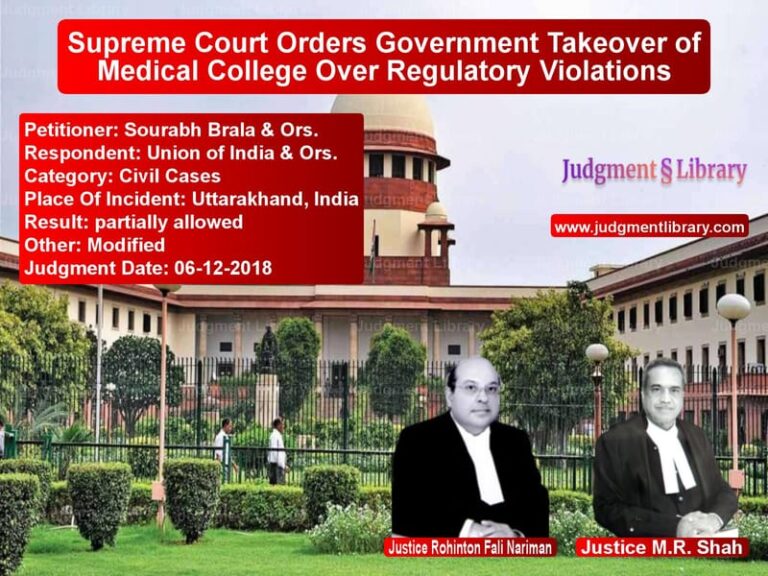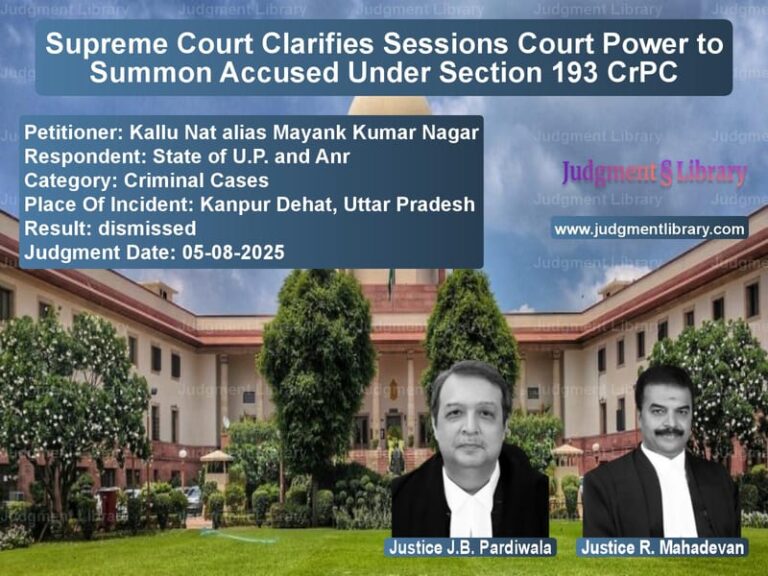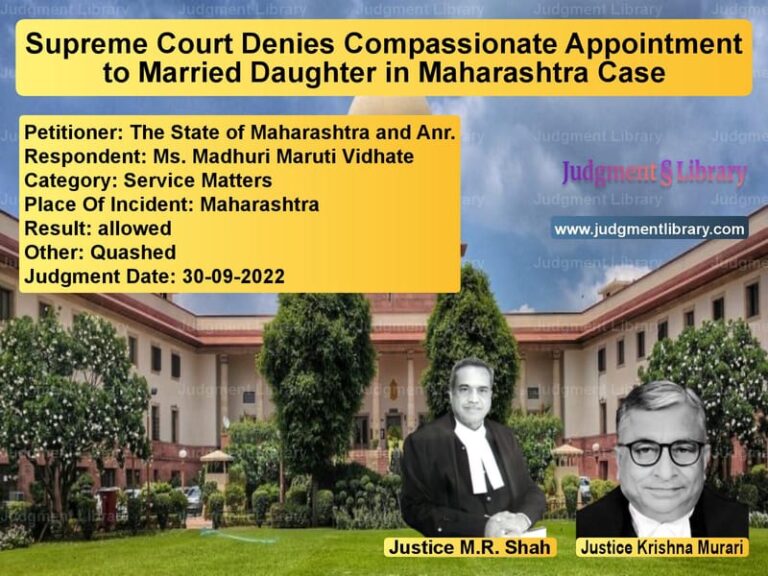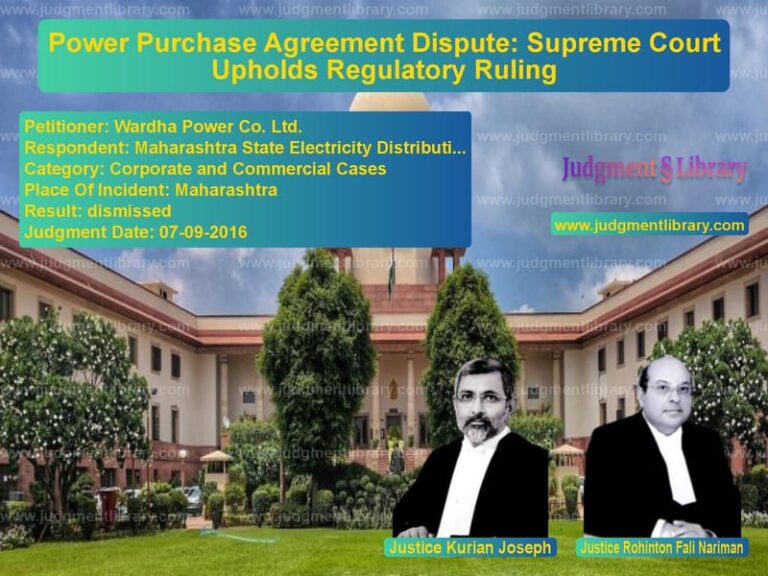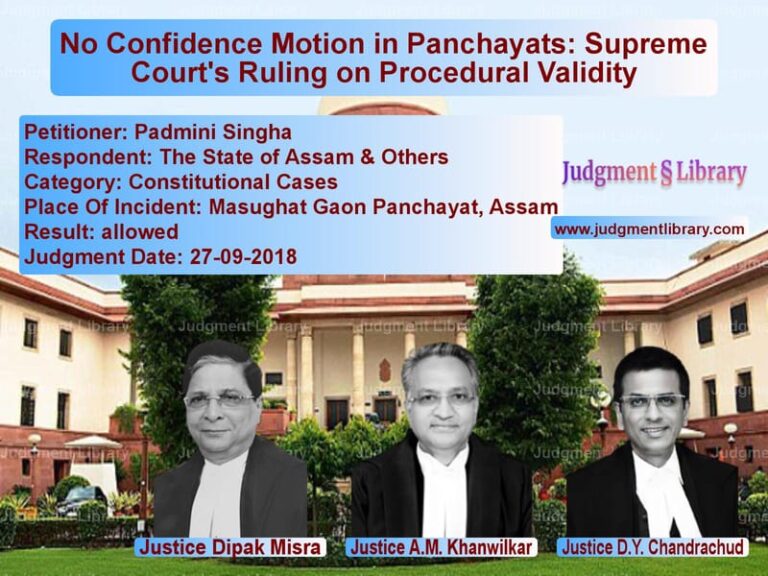Contempt of Court: Supreme Court Fines Directors for Violating Stay Order
The case of Ghanshyam Sarda vs. Sashikant Jha & Others is a significant ruling on contempt of court, delivered by the Supreme Court on November 18, 2016. The case revolves around alleged violations of a court order prohibiting the sale of company assets and the subsequent transfer of property in defiance of judicial directions.
Background of the Case
The case originated from a dispute concerning the assets of J.K. Jute Mills Company Ltd. (the “Company”), which had been under the jurisdiction of the Board for Industrial and Financial Reconstruction (BIFR) for revival under the Sick Industrial Companies (Special Provisions) Act, 1985. During the pendency of proceedings before the BIFR, the Supreme Court, in an earlier order dated May 8, 2014, explicitly restrained the sale of capital assets without the permission of the Court.
Despite this order, it was alleged that the Company’s assets in Katihar, Bihar, were transferred through a Conveyance Deed dated July 2, 2014. The petitioners filed contempt petitions against the directors and officials of the company, arguing that the transfer was made in blatant disregard of the Supreme Court’s order.
Key Legal Issues Considered
- Did the respondents willfully disobey the Supreme Court’s order prohibiting the transfer of assets?
- Was the Conveyance Deed dated July 2, 2014, valid, or was it a deliberate violation of judicial orders?
- Were the company’s directors and other alleged contemnors liable for contempt of court?
Arguments Presented
Petitioners’ Arguments:
- The Supreme Court’s order of May 8, 2014, explicitly prohibited the sale of assets, yet the Company proceeded with the transaction.
- The transfer of the Katihar property was done fraudulently at an undervalued price.
- The directors and officials of the company willfully violated the court order by facilitating the sale.
Respondents’ Arguments:
- The sale transaction had been initiated before the court’s order, and the final registration was merely a procedural act.
- The company believed that it was no longer subject to BIFR jurisdiction, which justified the transfer.
- Some of the directors had resigned before the transaction, and they were not involved in the sale.
Supreme Court’s Observations
The Supreme Court analyzed the facts and ruled that:
“The expression ‘shall not be disposed of’ in the order of May 8, 2014, meant that no transfer could take place. Since the transfer of assets was registered on July 2, 2014, it was a clear violation of the court’s order.”
The Court found that:
- The registration of the Conveyance Deed after the court’s order constituted contempt.
- The company’s claim that the transaction was completed earlier was not legally sustainable.
- The directors involved in the transfer had knowledge of the Supreme Court’s order but chose to ignore it.
Final Judgment
The Supreme Court ruled:
- The Company and its directors were held guilty of contempt of court for violating the Supreme Court’s stay order.
- A fine of Rs. 2,000 was imposed on the Company.
- Fines of Rs. 2,000 each were imposed on five individual directors.
- Failure to pay the fine would result in one month’s simple imprisonment for the guilty directors.
- The Court, however, did not invalidate the property transfer but left the issue to be dealt with by the BIFR.
Impact of the Judgment
The ruling has significant implications:
- It reinforces the binding nature of Supreme Court orders, emphasizing that no party can disregard judicial directions.
- It establishes that contempt of court is a serious offense and can lead to penalties, including imprisonment.
- It highlights the Supreme Court’s power to enforce compliance with its orders and prevent the misuse of legal loopholes.
Conclusion
The Supreme Court’s decision in Ghanshyam Sarda vs. Sashikant Jha & Others serves as a strong reminder that judicial orders must be followed strictly. By penalizing the violators, the Court upheld the rule of law and ensured that no party could evade compliance with binding judicial directions.
Don’t miss out on the full details! Download the complete judgment in PDF format below and gain valuable insights instantly!
Download Judgment: Ghanshyam Sarda vs Sashikant Jha, Direc Supreme Court of India Judgment Dated 18-11-2016.pdf
Direct Downlaod Judgment: Direct downlaod this Judgment
See all petitions in Corporate Governance
See all petitions in Bankruptcy and Insolvency
See all petitions in Legal Malpractice
See all petitions in Judgment by Uday Umesh Lalit
See all petitions in partially allowed
See all petitions in supreme court of India judgments November 2016
See all petitions in 2016 judgments
See all posts in Corporate and Commercial Cases Category
See all allowed petitions in Corporate and Commercial Cases Category
See all Dismissed petitions in Corporate and Commercial Cases Category
See all partially allowed petitions in Corporate and Commercial Cases Category


